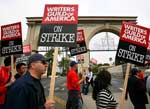
Don’t Let Writers Stand Alone – All Media Workers Should Join the WGA on Strike!
(December 2007).
click on photo for article
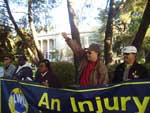
Militant Protest Against Racist Cop
Attack on Bay Area Longshore Workers (October 2007).
click
on photo for article
February 2008
AFL-CIO and Change to Win vs. the FMPR
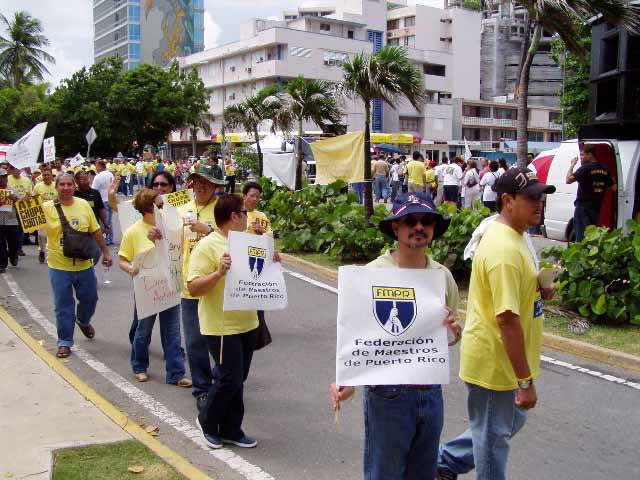
Hundreds of members of the Puerto Rican Teachers Federation (FMPR) protest outside “hearings”
called by American Federation of Teachers as AFT prepared to bring in the colonial courts.
(Photo: Carlos Quirós/LaborNet)
As
the Puerto Rican Teachers Federation (FMPR – Federación de
Maestros de Puerto
Rico) prepares to strike against a virulently anti-labor governor,
Aníbal
Acevedo Vilá of the Popular Democratic Party (PPD), braving
draconian no-strike
legislation (Law 45), unions affiliated with the American Federation of
Labor-Congress of Industrial Organizations (AFL-CIO) and the Change to
Win
(CTW) federation are outrageously lining up with the bosses.
This will
come as no surprise to those who know something of the sordid history
of the
American labor bureaucracy in the U.S.’ Caribbean island colony, and as
accomplices of imperialist machinations throughout Latin America (and
the rest
of the world). But what the labor fakers are preparing is a major betrayal
of Puerto Rican workers. A crucial test is shaping up in which all
of labor
will have to take a stand. Which side are you on?
On
January 1, Dennis Rivera, vice president of the Service Employees
International
Union (SEIU), the main component of CTW, and Aida Díaz, head of
the “Association
of Teachers of Puerto Rico” (AMPR), announced that they had begun “a
process of
affiliation to obtain a triumph in the union elections of the
Department of
Education” (AP, 1 January). At first glance this would appear to be an
old-fashioned raid on the FMPR. But it’s worse than that. The
SEIU/CTW
and AMPR are working hand-in-glove with Education Secretary Rafael
Aragunde,
who for more than two years dragged his heels refusing to negotiate
with the
Teachers Federation leaders, and then last month got the Public Sector
Labor
Relations Commission to decertify the FMPR. As the New York
Spanish-language
daily El Diario-La Prensa (3 February) reported:
“The
battle takes place in anticipation of a major teachers strike that
threatens to
paralyze the public school system and in which Change to Win is
positioned as a
strategic ally of the island’s autonomous government, which wants to
push the
Teachers Federation out.”
As
for the AMPR: this is not a workers organization at all but a
“professional”
outfit that includes supervisors and even Aragunde’s spokesman who
delivers his
strikebreaking threats. Since it is not registered as a labor group,
the Association
has set up a phantom “teachers union” whose first act will be to scab.
Its members will “attempt to work in the classroom” in the event of a
teachers
strike, said a spokesman, while pretending to “avoid confrontations” (Primera
Hora, 4 February). Every experienced trade-unionist knows what that
means:
they are preparing to provoke violence on the picket lines. But while
Education
Secretary Aragunde calls on retired teachers to give classes during a
strike
and the governor prepares to use the Shock Force (Fuerza de Choque) of
the
Puerto Rican Police and even the National Guard against the FMPR to
keep
schools open, spokesmen for the retired teachers vowed they would not
act as
strikebreakers.
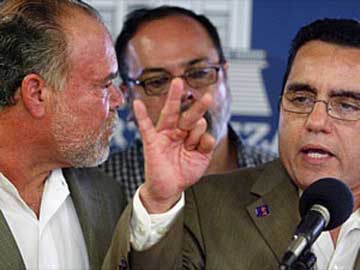 Faces of ignominy: sellout bureaucrats
José Rodríguez Báez of the FT,
Fernando Juarbe (UAW) and Roberto Pagán (SPT-SEIU 1996) while
they were denouncing the upcoming strike of the FMPR, January 18.
Also putting the knife in the teachers’ backs were representatives of
the SPU, UFCW, SEIU 1199 and CWA. (Photo:
Coordinadora Sindical)
Faces of ignominy: sellout bureaucrats
José Rodríguez Báez of the FT,
Fernando Juarbe (UAW) and Roberto Pagán (SPT-SEIU 1996) while
they were denouncing the upcoming strike of the FMPR, January 18.
Also putting the knife in the teachers’ backs were representatives of
the SPU, UFCW, SEIU 1199 and CWA. (Photo:
Coordinadora Sindical)
For
its part, the AFL-CIO, through its affiliate, the Puerto Rican Workers
Federation (FT), joined with the SEIU affiliates on the island – the
SPT
(Puerto Rican Workers Union) and UGT (General Workers Union) – to
denounce the
Teachers Federation’s call for a strike. While claiming to support the
right to
strike in the abstract, at a press conference shortly after the
decertification
of the teachers union, FT leader José Rodríguez
Báez announced that “we are
against their call for a strike.” Rodríguez Báez argued
that Law 45 had allowed
100,000 government employees to enjoy the benefits of collective
bargaining (Vocero
de Puerto Rico, 19 January). But when Governor Acevedo Vilá locked
out
95,000 government workers for two weeks in May 2006, they were
paralyzed by
this same law. Although they have many initials, each of the
U.S.-affiliated
labor “federations” has fewer members than the FMPR, the largest union
in
Puerto Rico. And now they are preparing to stab the teachers in the
back in
a crucial class battle.
Supporters
of the Internationalist Group in New York area teachers unions – the
United
Federation of Teachers (UFT), representing public school employees, and
the Professional
Staff Congress (PSC), representing City University of New York faculty
– have
called on them to undertake concrete actions in defense of the Puerto
Rican
Teachers Federation. We urge class-conscious trade-unionists throughout
the
United States to take up this struggle for concrete labor solidarity
with the
FMPR against the shameful anti-strike actions of the AFL-CIO and CTW
tops in
league with the union-busting government. If this class collaboration
escalates
to outright scabbing in the course of a strike, not only
should any
scabs receive the time-honored treatment they deserve for crossing
picket lines
– the battle lines of the class struggle – but the scabherders
in labor
officialdom should be vociferously denounced wherever they go.
AFT/AFL-CIO/CTW: A History of Betrayal of Puerto Rican Workers
The
treacherous action by the “Change to Win” bureaucrats is one more proof
that
they are not one bit more militant than the pie cards of the AFL-CIO.
Ever
since the labor tops knifed the PATCO air controllers’ strike in 1981,
they
have presided over a steady decline in the number of unionized workers
to
barely 12 percent of the workforce today. At the time of the 2005
split, SEIU
president Andy Stern claimed he was building a “new and stronger labor
organization.”
But while using publicity-grabbing tactics in the “Justice for
Janitors”
campaign, the core of “Stern’s efforts to modernize the way unions
work,” as Fortune
magazine (10 October 2006) noted, is to “cooperate” with management.
“Business
and labor have to work together on health care,” he announced, and
formed an
“alliance” with the union-bashers at Wal-Mart, whose employees still
overwhelmingly
lack health insurance. As for former 1199 leader/now SEIU veep Denis
Rivera,
his brand of labor opportunism is summed up in his political alliance
with NY Republican
governor George Pataki.
The
AFL-CIO’s collaboration with the bosses and their government is
notorious in
Puerto Rico. At the time of the hard-fought 1998 telephone workers
strike that
escalated into a two-day island-wide general strike, the FT leader
declared
that it was pointless to strike against privatization of the phone
company (see
“Puerto Rican General Strike: Forge a Revolutionary Workers Party!” The
Internationalist No. 6, November-December 1998). In 2003, FT chief
Rodríguez
Báez reaped an avalanche of protest when he wrote a private
letter to
then-governor Sila Calderón denouncing “some ‘labor leaders’”
who proposed that
a $150 monthly raise be extended to all government employees (Bandera
Roja,
18 June 2003).
But
the prime example of U.S. labor officialdom’s backstabbing
collaboration with
the colonial government of Puerto Rico against its employees concerns
the FMPR
itself. Since shortly after it was founded in 1966 the Puerto Rican
Teachers
Federation was affiliated to the American Federation of Teachers (AFT),
which
for decades has been run by the New York UFT. But in recent years there
was
growing discontent on the island over the high-handed actions of the
AFT brass,
and the precious few benefits received by teachers for $2.8 million
annually in
dues money paid to the AFT in Washington. This came to a head in 2003
when the
FMPR health insurance plan collapsed due to the pilfering of $43
million when
it was under the administration of the AFT’s man in San Juan,
Félix Rodríguez.
In May of that year, Rodríguez was voted out and replaced by
Rafael Feliciano
and his CODEMI (Commitment, Democracy, Militancy) caucus. CODEMI
campaigned on
a program for disaffiliation from the AFT, and in September 2004 an
FMPR assembly
voted by over 60% (793 to 393) to separate from the U.S. union.
The
AFT tops reacted with an escalating effort to take over the FMPR and
depose its
elected leadership. First, they claimed the vote was illegal, even
though their
own supporters were on the committee that counted the votes and signed
off on
the results. Then, at its July 2004 convention, the AFT pushed through
a series
of amendments to its constitution concerning putting locals in
receivership. It
was clear to all that this was aimed at the FMPR. They then proceeded
to
collect signatures from the members to justify placing the Puerto Rican
federation
under an AFT-appointed administrator. But although they were required
to
present 11,000 signatures (30 percent of the membership), they only
came up
with 650, many of whom were school employees but not union members. In
June
2005, the AFT held hearings in San Juan to “investigate” the FMPR
leadership
which were picketed by hundreds of teachers. And on July 6, at
precisely 4
p.m., the AFT executive council announced that it had appointed an
administrator for the FMPR.
While
claiming it had discovered “financial irregularities” in the Puerto
Rican
Federation (“Administratorship in Puerto Rico,” American Teacher,
September 2005), it didn’t mention that the administrator it named,
Félix
Rodríguez, had been in charge of the health fund when the $43
million mysteriously
disappeared. The AFT tops also neglected to mention that two minutes
before
their decision to impose an administrator, at 3:58 p.m., they had gone
to
federal court to get it to order the ouster of FMPR leader Rafael
Feliciano
(Luis Angel Torres, “The Hour of the Furnaces,” Bandera Roja,
29 July
2005). So behind the “pantomime” at the AFT exec board, they were
actually
running to the colonial courts to try to enforce their coup
d’état
against the elected leadership of the Teachers Federation. (They tried
earlier
with a Puerto Rican court, but with no luck.) The next day in
Washington, FMPR
members picketed the AFT headquarters with signs denouncing the AFT
“dues
suckers” (chupacuotas). Feliciano denounced the AFT’s idea of
union
democracy as “little less than medieval” and said, “Its imposition of
an
administratorship has as much substance as the wind” (Educational
Intelligence
Agency, 18 July 2005).
In
the upshot, the federal judge dismissed the AFT suit on the grounds
that the
Puerto Rican teachers are not covered by U.S. federal labor laws
(notably the
Taft-Hartley Act). The FMPR fought back by holding a referendum of its
membership on 18 August 2005 on the question of disaffiliation from the
AFT:
19,421 voted to disaffiliate (76 percent), while 5,882 favored keeping
the
affiliation, with 82 percent of the membership voting. There is no
doubt where
Puerto Rican teachers stood in exercising their rights.
It is a fundamental betrayal of workers
democracy to appeal to the
capitalist courts to intervene in the affairs of the workers movement.
Class-conscious workers oppose all judicial intervention in union
affairs. All
the more so in the case of a colony such as Puerto Rico, where the
courts, like
the police and National Guard, are the organs of direct imperialist
domination.
The AFT tops’ action was a vile case of trade-union colonialism which any
self-respecting unionist
or opponent of colonial rule must denounce.
We
Trotskyists defended Jimmy Hoffa against the government’s vendetta
against him.
We knew, as did any informed person, that the reason Democrat Bobby
Kennedy
went after the Teamster leader with a vengeance was not because the
U.S.
government favored union democracy but because they feared the
possibility of a
powerful nationwide truckers strike. In fact, the investigations of the
Teamsters began shortly after the first national Master Freight
Agreement was
signed. We also denounced the betrayal by supposed leftists in
Teamsters
for Democracy (TDU), backed by social democrats of the International
Socialists
and Solidarity, who ran to Ronald Reagan’s Labor Department to
supposedly bring
“democracy” to the truckers union. After TDU candidate Ron Carey was
elected in
government-run union elections in 1991, he was barred from reelection
in 1997
over misuse of union funds. The Teamster welfare funds that the
government
placed under “professional” management by financial “experts” lost
massive
amounts in the 2000-01 stock market crash, while the regional funds
that the
feds didn’t manage to seize are in good financial shape (due to
investments in
Las Vegas!).
In the case of Puerto Rico, appealing to the
federal
courts is to bring in the colonial masters who for more than a century,
ever
since 1898, have used Puerto Rico as a military base for U.S.
domination of the
Caribbean. It is appealing to the government that trampled on the
rights of tens
of thousands of Puerto Ricans with its spying, particularly
against those
who fought for independence. The police files (the carpetas)
became
known in the 1980s, causing a public outcry. After Bronx Democratic
Representative José Serrano questioned the FBI director at a
House Appropriations
subcommittee meeting in 2001, it was admitted that there were 1.8
million
pages in the files, copies of which are now being housed at the
Center for
Puerto Rican Studies at Hunter College in New York. They document every
movement
of Puerto Rican independence leader Pedro Albizu Campos as he was dying
in
federal prison, and include voluminous reports gathered under the
infamous
COINTELPRO spying and disruption program on “student demonstrations and
workers’ strikes” in the island (New York Times, 28 November
2003).
The “AFL-CIA” in Latin America
This
is the colonial governmental apparatus that the American Federation of
Teachers
appealed to in order to oust the leadership of the Puerto Rican
teachers union.
Later, to justify their betrayal, AFT leaders have resorted to vintage
red-baiting tactics, arguing that the present FMPR leadership has a
political
agenda, that they favor Puerto Rican independence and are socialists.
Feliciano
and others in the Federation leadership and the CODEMI caucus are
supporters of
the Movimiento Socialista de Trabajadores (MST – Socialist Workers
Movement).
So what? But the fact that the AFT resorts to such repulsive Cold War
tactics
is no accident. For decades under Albert Shanker and his heirs in
Social
Democrats U.S.A. (SDUSA), the AFT ran CIA-funded anti-Communist
union-busting
operations all over Latin America under the cover of the American
Institute for
Free Labor Development (AIFLD). This is documented in the pamphlet by
George
Schmidt, The American Federation of Teachers and the CIA
(1978). Shanker
et al. also funneled U.S. dollars to the pseudo-union Solidarność in
Poland
that in the guise of promoting “free trade unions” acted as a spearhead
of
capitalist counterrevolution in the Soviet bloc.
These
days “The Company’s” money is sent via conduits such as the National
Endowment
for Democracy, run by the same SDUSA crowd that used to run the AIFLD.
At the
AFL-CIO, the International Department has been replaced by the
“Solidarity
Center,” whose Latin American operations use Puerto Rican union
flunkeys and
sinister Cuban gusano Bay of Pigs veterans (like the former
CIA agent
who just punched former Puerto Rican governor Pedro Roselló in
the eye for
criticizing the Iraq war!). And now
they’re up to their old imperialist “dirty tricks” again. El
Diario-La
Prensa (14 January) reports that it has documented proof of the
identity of
“a paid propagandist of the government of Puerto Rico [who] has
participated in
at least one of the attempts by U.S. labor federations to retake
control of the
Teachers Federation,” at the time of the AFT takeover bid, and who “is
directly
linked to Governor Aníbal Acevedo Vilá.” Meanwhile, Wilda
Rodríguez, a former
press secretary for 1199 chief Dennis Rivera, is writing columns in El
Nuevo
Día (24 January) talking about strikers “provoking clashes”
in the context
of a “concerted civil action against the strike.” Just who is provoking
here?
A century ago, the American socialist Daniel
De Leon
coined the telling phrase describing union bureaucrats as the “labor
lieutenants of the capitalist class.” This accurately describes the
action of
the entire layer of union officialdom whose job, in a broad sense, is
to
control the ranks in the interests of maintaining capitalism. The
AFL-CIO, AFT
and SEIU/Change to Win international go beyond that to act as direct
agents of
imperialist repression. AFL-CIO union operatives helped prepare the
bloody
Pinochet coup against Salvador Allende’s Unidad Popular government in
Chile in
1973, for instance, by organizing “strikes” by truck owners. More
recently,
these labor operatives have been active in Hugo Chávez’
Venezuela in the course
of a counterrevolutionary 2002 coup disguised as a “strike” when it was
actually a bosses’ lockout. Now we see them at work again in the
Caribbean,
which Washington considers an “American lake,” just as they treat all
of Latin
America as the U.S.’ “back yard.”
Independence for Puerto Rico and All Colonies! For International Socialist Revolution!
But
these open agents of imperialism are the battering ram for the broader
pro-capitalist labor bureaucracy. While government agents should simply
be
chucked out of workers organizations, in the U.S. class-conscious
unionists
must struggle within the AFL-CIO and Change to Win federations and
other unions
to drive out the labor fakers who chain workers to the capitalist
parties,
particularly to the Democrats – but not exclusively, as the example of
Dennis
Rivera shows. Many leftists who criticize “AFL-CIA” dirty work in Latin
America
turn around and support pro-Democratic Party liberal bureaucrats in the
U.S.,
and even sue unions in the bosses’ courts (in the case of the
Teamsters, Mine
Workers, Transport Workers and other unions). Thus they use the same
tactics as
the AFT tops against the FMPR. Because they do not recognize the class
line
separating the proletariat from the bourgeoisie, they are inexorably
led into
“popular fronts” with the supposedly more “progressive” capitalist
parties
(such as Allende’s UP in Chile).
Ninety
years ago, in the midst of the First World War, V.I. Lenin explained
the fact
that most of the social democrats ended up supporting “their own”
bourgeoisie
in the imperialist slaughter by pointing to the role of the “labor
aristocracy.”
This social layer is bribed with crumbs from the imperialist table –
the plush
offices, overseas jaunts, high salaries, etc. – to chain the workers to
their
class enemies. Today, he wrote, “every imperialist ‘Great’ Power can
and does
bribe smaller strata (than in England in 1848–68) of the ‘labor
aristocracy.’
Formerly a ‘bourgeois labor party,’ to use [Friedrich] Engels’s
remarkably
profound expression, could arise only in one country, because it alone
enjoyed
a monopoly…. Now a ‘bourgeois labor party’ is inevitable and typical in
all
imperialist countries.” The Bolshevik leader continued: “The important
thing is
that, economically, the desertion of a stratum of the labor aristocracy
to the
bourgeoisie has matured and become an accomplished fact; and this
economic
fact, this shift in class relations, will find political form, in one
shape or
another, without any particular ‘difficulty’” (“Imperialism and the
Split in Socialism,”
October 1916).
Lenin’s
conclusion was that it was necessary to oust this social layer that
holds the
workers organizations in bondage to the bourgeoisie. But that required
a
political struggle not only against the open “social chauvinists” who
supported
“their own” imperialist rulers in war (as the AFT, AFL-CIO, CTW have
long
done), but also against “social pacifists” who want at most to change
the war policy
without challenging the imperialist system. While social pacifists like
Karl
Kautsky talked of “peace,” the Bolsheviks fought to “turn the
imperialist war
into civil war” by mobilizing the workers in class struggle against
imperialism. Today, as multiple “peace” coalitions with nearly
identical
political platforms squabble with each other over organizational
questions,
competing to get some Democratic politician on their platforms, the
Internationalist Group uniquely fights for workers strikes against the
war, for
labor to refuse to transport war materiel, and to defeat the
imperialist war
abroad and the bosses’ war on labor, oppressed minorities and
immigrants “at
home.” We struggle in the unions to replace the sellout labor
bureaucracy with
a class-struggle leadership, to break with the Democrats and forge
a revolutionary
workers party.
The
IG and the League for the Fourth International, of which it is the U.S.
section, have long fought for independence for Puerto Rico, and for a
voluntary
socialist federation of the Caribbean. As the early Communist
International
insisted, it is the elementary duty of revolutionaries in the
imperialist countries
to unconditionally support freedom for all colonies (see “ICL Renounces
Fight
for Puerto Rican Independence,” The Internationalist No. 6,
November-December 1998). At the same time, we fight politically against
illusions in bourgeois nationalists, such as the Puerto Rican
Independence
Party (PIP), or the host of petty-bourgeois nationalists who seek only
an
independent (capitalist) patria (“fatherland”). From the time
of the
Communist Manifesto on, it is axiomatic that in waging an internationalist
struggle against capitalism and imperialism, the workers have no
fatherland.
As Leon Trotsky underlined in his theory and program of permanent
revolution,
in the imperialist epoch, national liberation is not possible without
breaking
the chains of imperialism, through international socialist revolution.
Whether
or not unions in the colonies should remain part of unions in the
United States
is a tactical question that must be answered by revolutionaries in the
colonial
countries. Certainly when they are subjected to looting and diktats
smacking of colonial/imperialist arrogance, Puerto Rican unionists are
fully
justified in breaking organizational affiliations with such unions. Yet
being
part of unions organizing workers throughout the U.S. can enhance the
ability
to intervene directly in the imperialist heartland. The fact is that
the
largest single concentration of Puerto Ricans is in metropolitan New
York, the
center of international finance capital. In either case, proletarian
internationalists seek the closest collaboration of the workers in the
colonies, semi-colonial countries and inside the imperialist monster.
That is a
key reason why it is crucial to give the fullest support to
Puerto Rican
teachers today as they struggle against their colonial rulers
and the
“labor lieutenants” of imperialism. ■
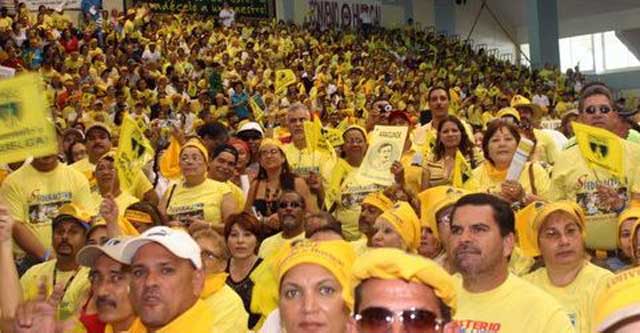
Union
assembly of the Federación de Maestros de Puerto Rico that voted
to authorize a strike, 11
November 2007. On the basis of this democratic vote, the government
decertified the FMPR.
(Photo: Coordinadora Sindical)
See also: Puerto Rico: All Out to Defend the Teachers’ Struggle! (14 February 2008)